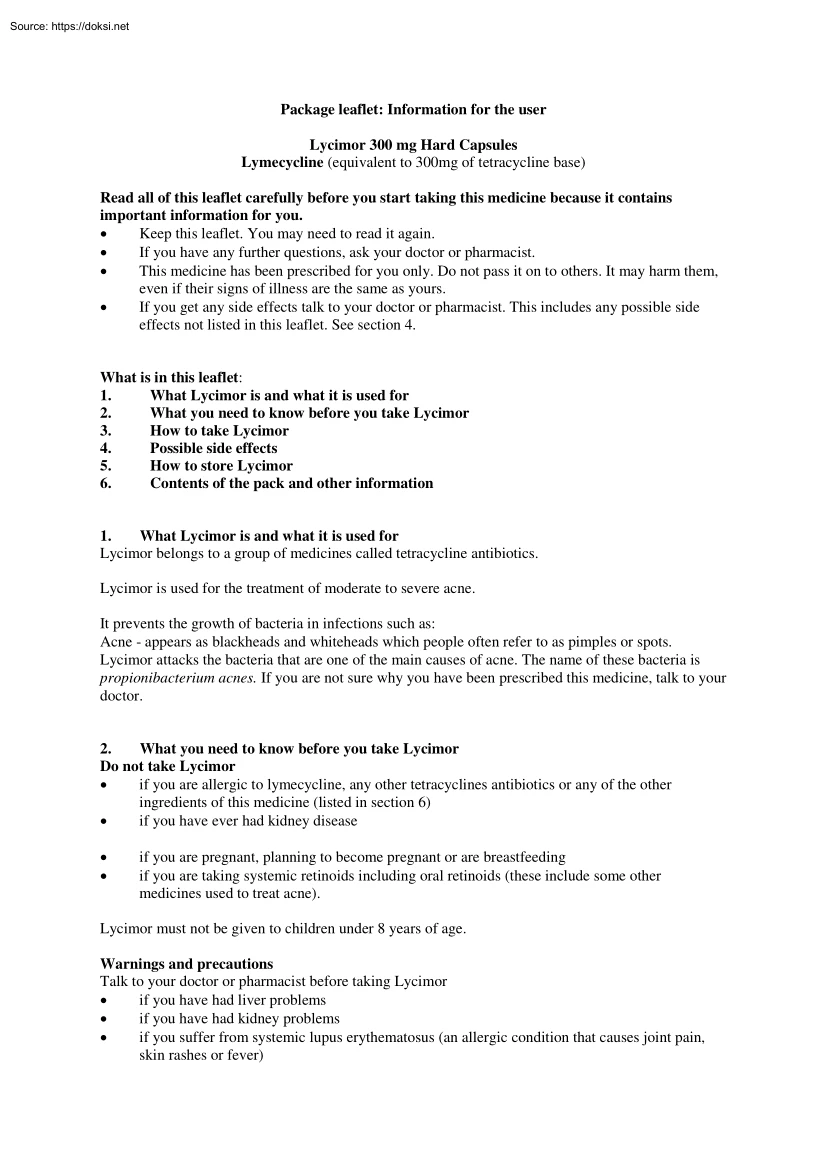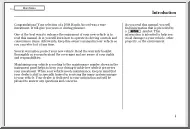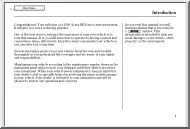Comments
No comments yet. You can be the first!
What did others read after this?
Content extract
Package leaflet: Information for the user Lycimor 300 mg Hard Capsules Lymecycline (equivalent to 300mg of tetracycline base) Read all of this leaflet carefully before you start taking this medicine because it contains important information for you. Keep this leaflet. You may need to read it again If you have any further questions, ask your doctor or pharmacist. This medicine has been prescribed for you only. Do not pass it on to others It may harm them, even if their signs of illness are the same as yours. If you get any side effects talk to your doctor or pharmacist. This includes any possible side effects not listed in this leaflet. See section 4 What is in this leaflet: 1. What Lycimor is and what it is used for 2. What you need to know before you take Lycimor 3. How to take Lycimor 4. Possible side effects 5. How to store Lycimor 6. Contents of the pack and other information 1. What Lycimor is and what it is used for Lycimor belongs to a group of medicines called
tetracycline antibiotics. Lycimor is used for the treatment of moderate to severe acne. It prevents the growth of bacteria in infections such as: Acne - appears as blackheads and whiteheads which people often refer to as pimples or spots. Lycimor attacks the bacteria that are one of the main causes of acne. The name of these bacteria is propionibacterium acnes. If you are not sure why you have been prescribed this medicine, talk to your doctor. 2. What you need to know before you take Lycimor Do not take Lycimor if you are allergic to lymecycline, any other tetracyclines antibiotics or any of the other ingredients of this medicine (listed in section 6) if you have ever had kidney disease if you are pregnant, planning to become pregnant or are breastfeeding if you are taking systemic retinoids including oral retinoids (these include some other medicines used to treat acne). Lycimor must not be given to children under 8 years of age. Warnings and precautions Talk to
your doctor or pharmacist before taking Lycimor if you have had liver problems if you have had kidney problems if you suffer from systemic lupus erythematosus (an allergic condition that causes joint pain, skin rashes or fever) if you suffer from Myasthenia Gravis (a disease that weakens the muscles) . You should avoid direct exposure to sunlight or artificial sunlight from sunbeds. If you experience skin discomfort then stop taking this medicine and seek advice from your doctor. Children and adolescents Lycimor is not recommended for use in children under 12 years of age as it can cause permanent discolouration of tooth enamel and affect bone development. Other medicines and Lycimor Tell your doctor or pharmacist if you are taking, have recently taken or might take any other medicines. Do not take the following medicines at the same time as Lycimor, as these could affect how well Lycimor works. Take them at least two hours before Lycimor or two hours after:
indigestion remedies ulcer healing drugs quinapril (for high blood pressure) supplements containing calcium, aluminium, magnesium, zinc or iron didanosine (used to treat HIV) Tell your doctor if you are taking any of the following: systemic retinoids including oral retinoids (to treat acne) anticoagulants (to stop the blood clotting) diuretics (used to treat kidney disease, heart disease or high blood pressure) Lycimor with food and drink Absorption of Lycimor is not affected by moderate amounts of milk (e.g a glass) Lycimor should always be taken with a glass of water. Pregnancy and breast-feeding Ask your doctor or pharmacist for advice before taking any medicine. Lycimor must not be taken if you are pregnant or breast-feeding. Use of medicines such as Lycimor may affect the proper growth of developing teeth and lead to permanent discolouration. Driving and using machines No studies on the effects on the ability to drive and use machines have been
performed. 3. How to take Lycimor Always take this medicine exactly as your doctor has told you. Check with your doctor or pharmacist if you are not sure. Adults and children over 12 years Moderate to severe acne The normal dose is one Lycimor capsule once a day, preferably in the morning. Lycimor capsules should always be taken with a glass of water, whilst in an upright position. They should also be taken with a light meal without dairy products. How long you will have to take Lycimor for will depend on how quickly your condition improves. For acne, this will normally be at least 8 to 12 weeks. Your physician may decide to continue with treatment for a maximum of 6 months. Children Do not give Lycimor to children below the age of 8. Lycimor is not recommended for use in children under 12 years of age as it can cause permanent discolouration of tooth enamel and affect bone development. Kidney impairment If you have a kidney problem your doctor may decide to reduce your dose. If
you take more Lycimor than you should If you (or someone else) takes too many capsules, or you think a child may have swallowed any, contact your nearest hospital casualty department or tell your doctor immediately. If you forget to take Lycimor If you forget to take a dose, simply take it when you remember and carry on as before unless it is time for the next dose. Do not take a double dose to make up for a forgotten dose You should never take more capsules than your doctor recommends. If you stop taking Lycimor Acne responds slowly to antibiotics. It is important that you take all the Lycimor that your doctor has prescribed for you. If you stop taking Lycimor too soon, your acne or infection could get worse or come back. If you have any further questions on the use of this medicine, ask your doctor or pharmacist. 4. Possible side effects Like all medicines, this medicine can cause side effects, although not everybody gets them. If you experience any of the following serious side
effects, stop taking your capsules and tell your doctor immediately or go to the nearest hospital accident and emergency department. This includes any side effects not listed in this leaflet. Not known frequency of occurrence (frequency cannot be estimated from the available data): Serious allergic reaction which causes swelling of the face, tongue and throat that can cause great difficulty in breathing. Serious illness with severe peeling and swelling of the skin, blistering of the skin, mouth, eyes, genitals and fever. Skin rash with pink-red blotches especially on palms of hands or soles of feet which may blister. Lycimor may also cause the following side effects: Common side effects (may affect up to 1 in 10 people) nausea (feeling sick) abdominal pain diarrhoea headache Not known frequency of occurrence (frequency cannot be estimated from the available data) disturbances of eyesight dizziness vomiting (being sick) yellowing of the skin or
eyes (jaundice) increased sensitivity of the skin to sunlight increased pressure in the brain changes in the number or type of certain blood cells pain in the upper part of the abdomen changes in some blood tests (tests of liver function) fever itchiness, skin rash or hives inflammation of the intestine The following side effects may occur during treatment with the class of medicines to which Lycimor belongs (the tetracyclines): inflammation or ulceration of the gullet, causing pain or difficulty swallowing or painful heartburn difficulty in swallowing inflammation of the pancreas liver damage teeth discolouration inflammation or soreness of the tongue, mouth, cheeks, gums or lips soreness or itching of the genital area yeast infection around the anus or genitals infection of the colon permanent visual loss Reporting of side effects If you get any side effects, talk to your doctor, pharmacist or nurse. This includes any possible side effects not
listed in this leaflet. You can also report side effects directly via HPRA Pharmacovigilance, Earlsfort Terrace, IRL - Dublin 2; Tel: +353 1 6764971; Fax: +353 1 6762517. Website: www.hpraie; E-mail: medsafety@hpraie By reporting side effects you can help provide more information on the safety of this medicine. 5. How to store Lycimor Keep this medicine out of the sight and reach of children. Do not use this medicine after the expiry date which is stated on the carton or blister after EXP. The expiry date refers to the last day of that month. Store below 25°C. Store in the original package in order to protect from light. Do not throw away any medicine via wastewater or household waste. Ask your pharmacist how to throw away medicines you no longer use. These measures will help protect the environment 6. Contents of the pack and other information What Lycimor contains The active substance is lymecycline. Each capsule contains 408 mg of lymecycline equivalent to 300 mg
tetracycline. The other ingredients are colloidal hydrated silica, magnesium stearate. Capsule body: titanium dioxide (E171), gelatine. Capsule cap: indigo carmine (E132), black iron oxide (E172), titanium dioxide (E171), yellow iron oxide (E172), gelatine. What Lycimor looks like and contents of the pack Hard gelatin capsule size 0, blue cap and white body. 16, 20, 21, 28, 56 and 100 capsules in Al/Al blister. Not all pack sizes may be marketed. Marketing Authorisation Holder and Manufacturer Marketing Authorisation Holder Actavis Group PTC ehf Reykjavikurvegi 76-78 220 Hafnarfjordur Iceland Manufacturer Balkanpharma-Dupnitsa AD 3 Samokovsko Shosse Str. 2600 Dupnitsa Bulgaria This medicinal product is authorised in the Member States of the EEA under the following names: Denmark Finland Iceland Ireland Norway Poland Sweden Lymecyclin Actavis Lymecycline ratiopharm 300 mg kapselit, kovat Lymecycline Actavis Lycimor 300 mg Hard Capsules Lymecyclin Actavis Damelium Lymecycline
Actavis 300 mg kapsel, hård This leaflet was last revised in July 2018
tetracycline antibiotics. Lycimor is used for the treatment of moderate to severe acne. It prevents the growth of bacteria in infections such as: Acne - appears as blackheads and whiteheads which people often refer to as pimples or spots. Lycimor attacks the bacteria that are one of the main causes of acne. The name of these bacteria is propionibacterium acnes. If you are not sure why you have been prescribed this medicine, talk to your doctor. 2. What you need to know before you take Lycimor Do not take Lycimor if you are allergic to lymecycline, any other tetracyclines antibiotics or any of the other ingredients of this medicine (listed in section 6) if you have ever had kidney disease if you are pregnant, planning to become pregnant or are breastfeeding if you are taking systemic retinoids including oral retinoids (these include some other medicines used to treat acne). Lycimor must not be given to children under 8 years of age. Warnings and precautions Talk to
your doctor or pharmacist before taking Lycimor if you have had liver problems if you have had kidney problems if you suffer from systemic lupus erythematosus (an allergic condition that causes joint pain, skin rashes or fever) if you suffer from Myasthenia Gravis (a disease that weakens the muscles) . You should avoid direct exposure to sunlight or artificial sunlight from sunbeds. If you experience skin discomfort then stop taking this medicine and seek advice from your doctor. Children and adolescents Lycimor is not recommended for use in children under 12 years of age as it can cause permanent discolouration of tooth enamel and affect bone development. Other medicines and Lycimor Tell your doctor or pharmacist if you are taking, have recently taken or might take any other medicines. Do not take the following medicines at the same time as Lycimor, as these could affect how well Lycimor works. Take them at least two hours before Lycimor or two hours after:
indigestion remedies ulcer healing drugs quinapril (for high blood pressure) supplements containing calcium, aluminium, magnesium, zinc or iron didanosine (used to treat HIV) Tell your doctor if you are taking any of the following: systemic retinoids including oral retinoids (to treat acne) anticoagulants (to stop the blood clotting) diuretics (used to treat kidney disease, heart disease or high blood pressure) Lycimor with food and drink Absorption of Lycimor is not affected by moderate amounts of milk (e.g a glass) Lycimor should always be taken with a glass of water. Pregnancy and breast-feeding Ask your doctor or pharmacist for advice before taking any medicine. Lycimor must not be taken if you are pregnant or breast-feeding. Use of medicines such as Lycimor may affect the proper growth of developing teeth and lead to permanent discolouration. Driving and using machines No studies on the effects on the ability to drive and use machines have been
performed. 3. How to take Lycimor Always take this medicine exactly as your doctor has told you. Check with your doctor or pharmacist if you are not sure. Adults and children over 12 years Moderate to severe acne The normal dose is one Lycimor capsule once a day, preferably in the morning. Lycimor capsules should always be taken with a glass of water, whilst in an upright position. They should also be taken with a light meal without dairy products. How long you will have to take Lycimor for will depend on how quickly your condition improves. For acne, this will normally be at least 8 to 12 weeks. Your physician may decide to continue with treatment for a maximum of 6 months. Children Do not give Lycimor to children below the age of 8. Lycimor is not recommended for use in children under 12 years of age as it can cause permanent discolouration of tooth enamel and affect bone development. Kidney impairment If you have a kidney problem your doctor may decide to reduce your dose. If
you take more Lycimor than you should If you (or someone else) takes too many capsules, or you think a child may have swallowed any, contact your nearest hospital casualty department or tell your doctor immediately. If you forget to take Lycimor If you forget to take a dose, simply take it when you remember and carry on as before unless it is time for the next dose. Do not take a double dose to make up for a forgotten dose You should never take more capsules than your doctor recommends. If you stop taking Lycimor Acne responds slowly to antibiotics. It is important that you take all the Lycimor that your doctor has prescribed for you. If you stop taking Lycimor too soon, your acne or infection could get worse or come back. If you have any further questions on the use of this medicine, ask your doctor or pharmacist. 4. Possible side effects Like all medicines, this medicine can cause side effects, although not everybody gets them. If you experience any of the following serious side
effects, stop taking your capsules and tell your doctor immediately or go to the nearest hospital accident and emergency department. This includes any side effects not listed in this leaflet. Not known frequency of occurrence (frequency cannot be estimated from the available data): Serious allergic reaction which causes swelling of the face, tongue and throat that can cause great difficulty in breathing. Serious illness with severe peeling and swelling of the skin, blistering of the skin, mouth, eyes, genitals and fever. Skin rash with pink-red blotches especially on palms of hands or soles of feet which may blister. Lycimor may also cause the following side effects: Common side effects (may affect up to 1 in 10 people) nausea (feeling sick) abdominal pain diarrhoea headache Not known frequency of occurrence (frequency cannot be estimated from the available data) disturbances of eyesight dizziness vomiting (being sick) yellowing of the skin or
eyes (jaundice) increased sensitivity of the skin to sunlight increased pressure in the brain changes in the number or type of certain blood cells pain in the upper part of the abdomen changes in some blood tests (tests of liver function) fever itchiness, skin rash or hives inflammation of the intestine The following side effects may occur during treatment with the class of medicines to which Lycimor belongs (the tetracyclines): inflammation or ulceration of the gullet, causing pain or difficulty swallowing or painful heartburn difficulty in swallowing inflammation of the pancreas liver damage teeth discolouration inflammation or soreness of the tongue, mouth, cheeks, gums or lips soreness or itching of the genital area yeast infection around the anus or genitals infection of the colon permanent visual loss Reporting of side effects If you get any side effects, talk to your doctor, pharmacist or nurse. This includes any possible side effects not
listed in this leaflet. You can also report side effects directly via HPRA Pharmacovigilance, Earlsfort Terrace, IRL - Dublin 2; Tel: +353 1 6764971; Fax: +353 1 6762517. Website: www.hpraie; E-mail: medsafety@hpraie By reporting side effects you can help provide more information on the safety of this medicine. 5. How to store Lycimor Keep this medicine out of the sight and reach of children. Do not use this medicine after the expiry date which is stated on the carton or blister after EXP. The expiry date refers to the last day of that month. Store below 25°C. Store in the original package in order to protect from light. Do not throw away any medicine via wastewater or household waste. Ask your pharmacist how to throw away medicines you no longer use. These measures will help protect the environment 6. Contents of the pack and other information What Lycimor contains The active substance is lymecycline. Each capsule contains 408 mg of lymecycline equivalent to 300 mg
tetracycline. The other ingredients are colloidal hydrated silica, magnesium stearate. Capsule body: titanium dioxide (E171), gelatine. Capsule cap: indigo carmine (E132), black iron oxide (E172), titanium dioxide (E171), yellow iron oxide (E172), gelatine. What Lycimor looks like and contents of the pack Hard gelatin capsule size 0, blue cap and white body. 16, 20, 21, 28, 56 and 100 capsules in Al/Al blister. Not all pack sizes may be marketed. Marketing Authorisation Holder and Manufacturer Marketing Authorisation Holder Actavis Group PTC ehf Reykjavikurvegi 76-78 220 Hafnarfjordur Iceland Manufacturer Balkanpharma-Dupnitsa AD 3 Samokovsko Shosse Str. 2600 Dupnitsa Bulgaria This medicinal product is authorised in the Member States of the EEA under the following names: Denmark Finland Iceland Ireland Norway Poland Sweden Lymecyclin Actavis Lymecycline ratiopharm 300 mg kapselit, kovat Lymecycline Actavis Lycimor 300 mg Hard Capsules Lymecyclin Actavis Damelium Lymecycline
Actavis 300 mg kapsel, hård This leaflet was last revised in July 2018





